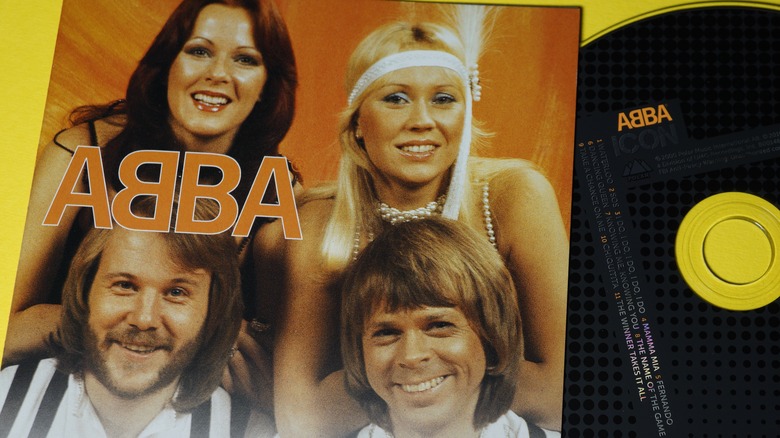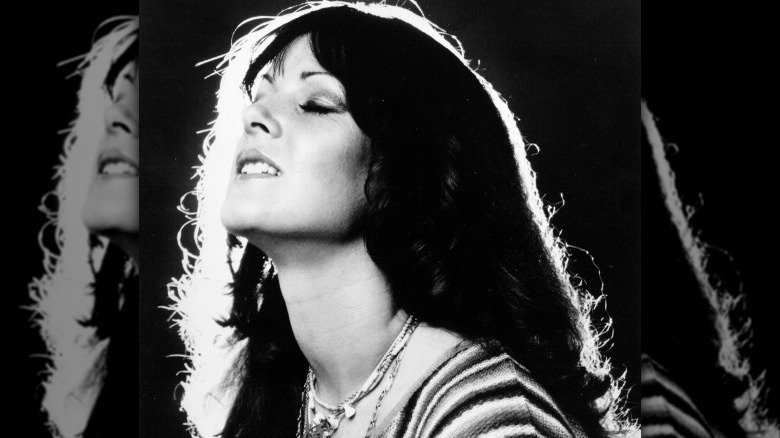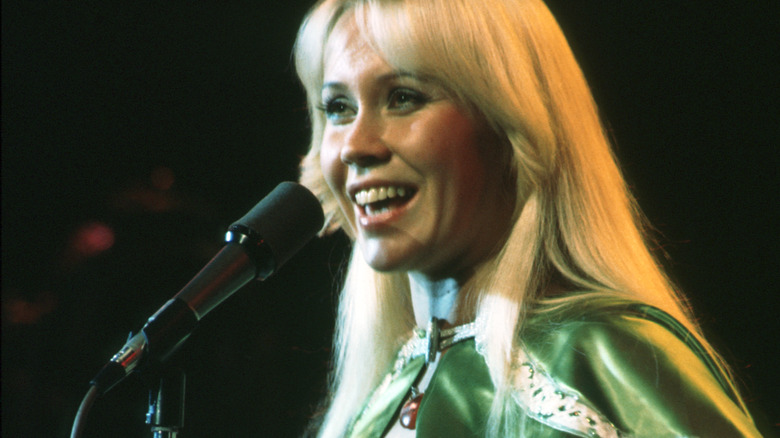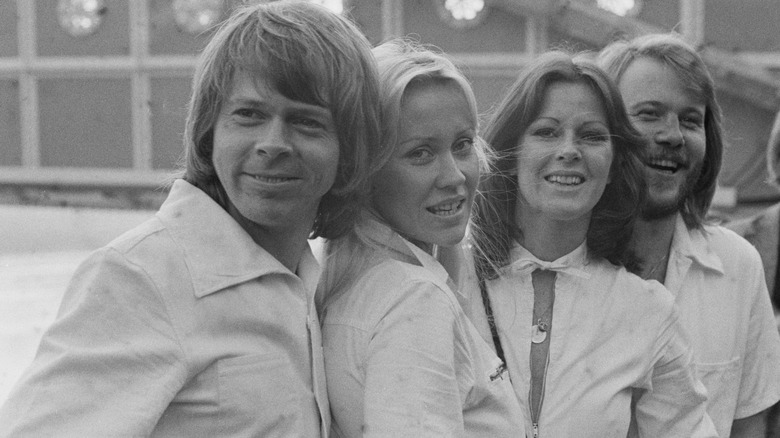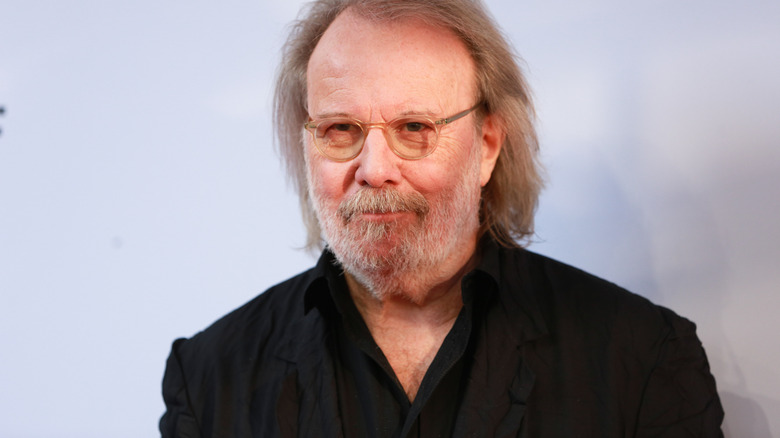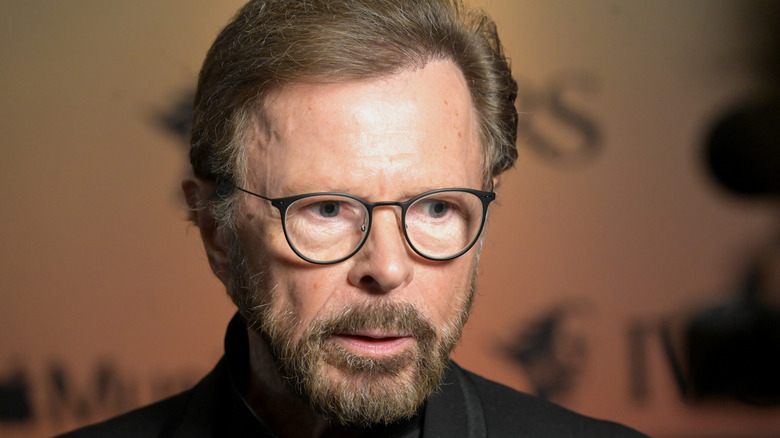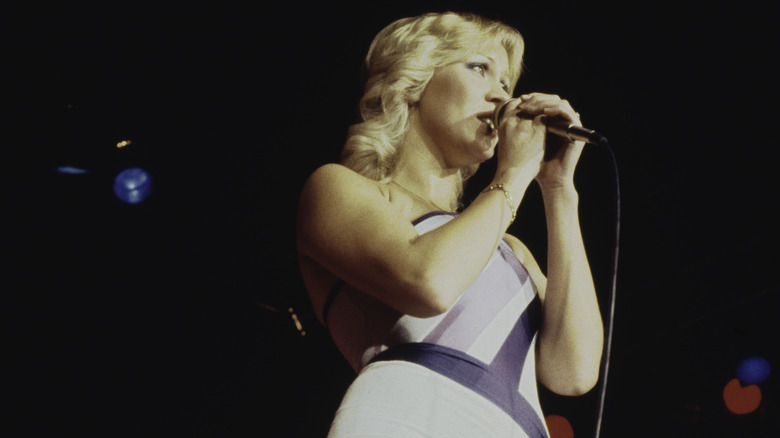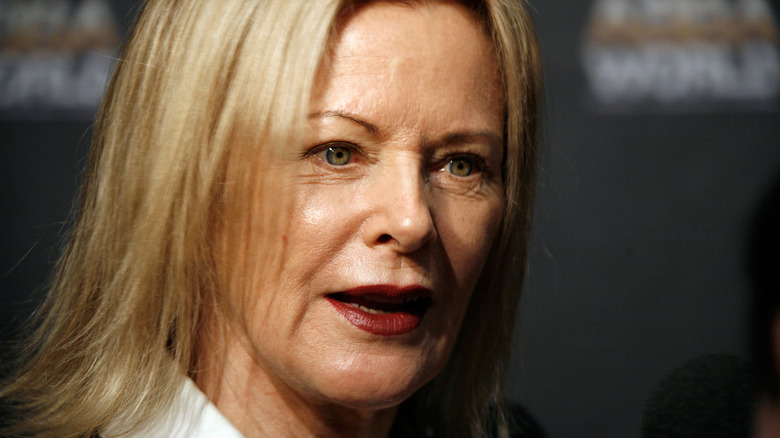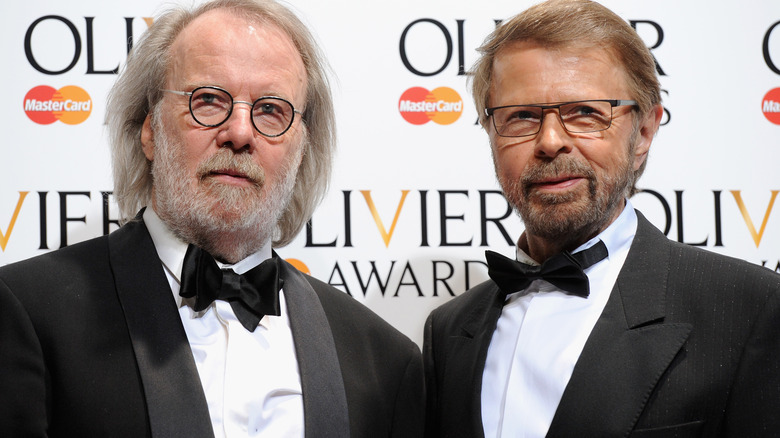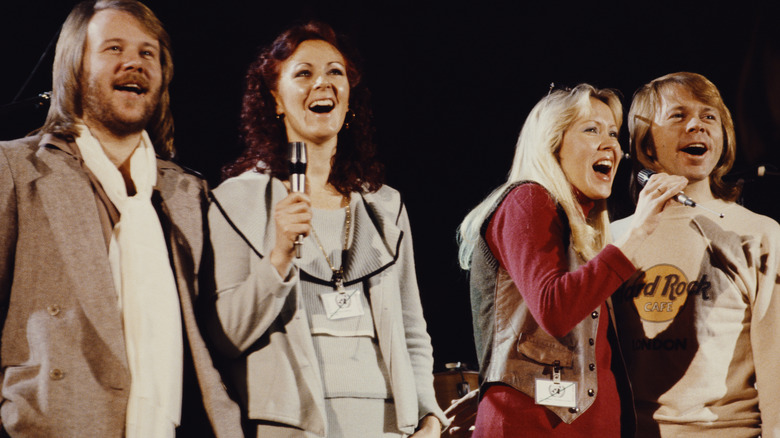Tragic Details About ABBA
Anyone who's ever been caught lip-syncing to and dancing along with songs like "Waterloo" and "Dancing Queen" knows that there's a little bit of red-faced action going on when it's discovered someone not only knows all the words but the moves. According to The Guardian, that's been part of ABBA's curse for a long time: They're a guilty pleasure, and here's the thing — they know it. Anni-Frid Lyngstad credited the group's background for not letting it get to them: "I think being Swedes, we have a very down-to-earth way of looking at ourselves and what we do. We've never had any, what do you call it... hubris?"
And honestly, that's a pretty brilliant way of looking at things — whether you're an ordinary, everyday sort of person, or a chart-topping pop group that still managed to be not quite mainstream... and played at 90% of all weddings ever held. (Approximately.)
ABBA gave another interview in 2021, around their regrouping and their pretty nifty, heavily tech-reliant reappearance on stage. They were incredibly candid about how they knew they were "so uncool," and how they hadn't expected to be remembered much past their breakup. It would have been a tragedy if they'd been forgotten, and while they managed to dodge a downfall into obscurity, they haven't had an easy road. The four members have avoided many of the pitfalls of fame — there are no losses to drugs, no arrests for wild behavior, and they've all survived the fame — but they've had their struggles.
Anni-Frid Lyngstad was a Lebensborn baby
Anni-Frid Lyngstad — more popularly known as Frida — was born in November of 1945, which history buffs will immediately recognize as being just after the official end of World War II. For many Norwegian families, the shadow of the war not only lingered but shaped their lives.
Lyngstad was one of the thousands born under the umbrella of the Nazi's Lebensborn program, which was the brainchild of Heinrich Himmler. In an attempt to expand his ideal Aryan race, he encouraged Nazi officers to have children with as many racially-appropriate women as they could, particularly in Nazi-occupied countries. Lyngstad's mother, Synni, was one of those women, and once the Nazis retreated, the children — and their mothers — that were left behind were not treated well. DW says they were called the "children of shame," and The Guardian adds that they weren't just looked down on, they were ostracized, labeled as traitors, and many left the country. Children were classified as "rats," while mothers were deemed "asocial psychopaths."
Lyngstad's little family moved to Sweden, and she was still a toddler when her mother died of kidney failure. It wasn't until decades later that she met her father, one-time German sergeant and pastry chef Alfred Haase. She later said that the meeting had been difficult and she hadn't been able to connect with him as her father, while those who knew her said the estrangement and her difficult childhood had been part of the reason for her struggles with depression.
Agnetha Faltskog hid the trauma of what happened to her parents
In 2016, the four members of ABBA briefly reunited for a private party in Stockholm. According to the Scottish Daily Mail, there was no publicity around the event and Anni-Frid Lyngstad was quick to stress that no, it didn't mean they were reuniting for anything else. The Mail speculated that it had something to do with the reclusive nature of Agnetha Faltskog, who was dealing with a series of personal traumas in her past, including the deaths of her parents.
In her biography, Faltskog had said that her mother had died in a tragic accident, but according to The Mirror, it was only in 2005 that it was revealed that wasn't the case at all. Birgit Faltskog had committed suicide, and Agnetha's father, Ingvar, had died just about a year later.
ABBA biographer Carl Magnus Palm came forward to address the inconsistency, saying that she had been incredibly tight-lipped when it came to her childhood and parents. He added that all the information he had been able to find about her parents indicated that her mother had passed away in an accident. Faltskog spoke about her mother's death in 2013, in an interview with The Daily Mail. She shared: "It was terrible. You wonder if you could have done something. ... I was depressed after that. ... You carry pain through your life, and when you get distance from it, you survive — but it never leaves you."
The group split when their marriages broke up
ABBA's career-defining moment came in 1974, when they won Eurovision (via the Independent). The two couples of ABBA were also already married: Benny Andersson and Anni-Frid Lyngstad had met in 1969, the same as Bjorn Ulvaeus and Agnetha Faltskog. When the Evening Standard took a retrospective look back at what happened to ABBA, they said it was clear: The couples both divorced — in 1980 and 1981 — and in 1982, ABBA was no more.
Details have come out over the years, and in 2013, Faltskog talked about one of their last hits — "The Winner Takes It All" — and how it had been written by her ex-husband about their divorce. She had sung it, and when she was asked about lines like "Tell me does she kiss/Like I used to kiss you?" she said: "It was a mixture of what I felt and what Bjorn felt but also what Benny and Frida went through."
Meanwhile, Lyngstad was going through her own divorce, and spoke about it with The Guardian years later. She recalled being very limited in the ways she could move on with her life, as she was still required to work and perform alongside her now ex-husband. She opted for a complete overhaul of her image. What followed was some of the music that Ulvaeus called their best: "We felt like we had something so valuable ... even though it was difficult, we didn't want to break that up."
Benny Andersson quit drinking after realizing he had a problem
By 1983, ABBA had made it clear that there was going to be no more music, no more performances, and no more touring: It was Bjorn Ulvaeus who explained that there was no desire or need for them to reunite, telling the Sunday Telegraph: "...we would like people to remember us as we were: young, exuberant, full of energy and ambition."
The four went their separate ways, and it was only in 2011 that Benny Andersson did an interview (via The Telegraph) that revealed his post-ABBA years had been shaped by addiction. At the time of the interview, he had been sober for nine years after seeking treatment for alcohol addiction. Saying that he realized he had a problem when he found that he didn't feel like himself when he wasn't drinking, he added: "When it's about the difficult battle against addiction, it doesn't matter who you are."
Forthcoming about what it was that finally convinced him that he needed to get professional help, Andersson said (via Express): "I knew that if I continued drinking there was a risk I would lose everything. If you drink enough for a long enough time, you will lose things."
Andersson wasn't alone during the interview, and he was joined by his son, Ludvig. Tragically, he'd had his own struggles with both drugs and alcohol, and spoke about how "it's possible to drink and get addicted pretty quickly."
Agnetha Faltskog has spoken about her mental health
Agnetha Faltskog's withdrawal from the public eye — and recording — happened gradually, she told The Guardian in 2013. After ABBA, she released a few solo albums but said that she was much happier focusing on her children, grandchildren, and her life at home. She also gave several interviews (via The Telegraph) where she spoke on the reports that she was secretive, reclusive, and struggling with depression, saying that wasn't the story.
Part of her reclusiveness and refusal to make appearances was because she suffered from a paralyzing fear of flying. It started in 1979, she said, when ABBA's plane had been hit by a tornado and was forced to land. It was so bad that when she spoke to The Daily Mail in 2013, she revealed that she went to therapy to help her overcome the fear, and was finally able to fly — but just for a maximum of three and a half hours at a time.
Faltskog argued that she wasn't reclusive or troubled, she was just private — and it was misunderstood. The chaos of ABBA took a toll: In a rare, 2005 interview (via the Irish Independent), she spoke about how fame had sparked not only a series of phobias — including her fear of flying, crowds, and open spaces — but that she was plagued by nightmares of being suffocated by the weight of their fans. By the time they called it quits, stepping away from the spotlight had become a necessity.
Bjorn Ulvaeus struggles with severe memory loss
A 2008 interview with Bjorn Ulvaeus addressed the reason why he had never had any interest in writing or authorizing an official biography, and it was simply because he didn't remember most of his early life — including his time with ABBA, and their win at Eurovision. Ulvaeus told This is London (via The Huffington Post) that he suffers from long-term memory loss, and huge pieces of ABBA's run — along with memories from his childhood — are simply gone. He described watching their performance of "Waterloo" at Eurovision, saying, "It is unbelievable, but I do not remember standing on the stage. It is like I was not even there."
Gone, too, is the aftermath of the performance and their win, along with most of his younger years. Ulvaeus has said that he's attempted to recover his lost memories with the help of hypnosis, and by sitting down with friends and family to look through photos. They spark nothing, though, and it's left him doubting the memories he does have: "I honestly don't know if [the memories] are true, or it is someone who told me about it."
In 2013, The Daily Mail asked Ulvaeus's ex-wife, Agnetha Faltskog, if he had consulted with her to fill in some of the blanks. She explained that while she saw him at some of the events in the lives of the children they shared, she said: "I haven't talked to him about that. We don't have that sort of relationship."
Agnetha Faltskog had a terrifying experience with her stalker
The creepy, hyper-sexualization of the women of ABBA started when they were just teenagers. The media was pretty awful, and fast-forward to 2013, The Daily Mail reflected on Agnetha Faltskog's experiences with stalkers. One got incredibly close.
That was a truck driver named Gert van der Graaf. When Faltskog left the public eye and settled on a remote island outside Stockholm, van der Graaf followed her to that island and set himself up in a house just a stone's throw from hers. According to the documentary "ABBA: Behind the Blonde" (via The Guardian), he had been obsessed with her since he had — at age 8 — seen ABBA perform on Eurovision. So, he pursued her — and shockingly, the BBC says they dated between 1997 and 1999. Things ended incredibly badly, and Faltskog applied for a restraining order against him in 2000. He was also deported back to the Netherlands, and in 2003, he was arrested again after neighbors saw him back in Sweden and back near her home.
Rumors about just how far his devotion to her went were detailed in the documentary, and van der Graaf has been quoted repeatedly as professing his love for her. Faltskog, meanwhile, has lamented her trusting nature, admitting: "I want to give everyone a chance."
Anni-Frid Lyngstad lost both her daughter and her husband to tragedy
Some suffer so much personal tragedy that it starts to become possible to believe in curses, and that's the case with Anni-Frid Lyngstad. In addition to the loss of her mother while she was still a toddler and the divorce that broke apart ABBA, Lyngstad also suffered the loss of her daughter from her first marriage.
According to Australia's official ABBA Fan Club, Lyngstad married Ragnar Fredriksson when she was 17. They had two children and divorced in 1970. (The same day their divorce became official, Lyngstad lost the grandmother who had fled the stigma of the Lebensborn with her, and raised her after her mother's death.)
Fast forward a bit, and Lyngstad married again in 1992. This time, it was to Prince Ruzzo Reuss von Plauen, making her stepdaughters two Swedish princesses. Happiness was short-lived: Lyngstad's daughter, Ann Lise-Lotte, died in 1998 after being in a severe car accident. Just a year later, she lost her husband as well. According to the BBC, Ruzzo passed away after being diagnosed with cancer.
Their former drummer died in a tragic accident
Take another look at any live ABBA performance, and eagle-eyed viewers will notice that there are more than the famous four members on stage. Drummer Ola Brunkert toured with them through much of their relatively short run, and in 2008, the 61-year-old drummer died in a tragic accident.
According to his obituary in The New York Times, his body was found at his home on the island of Mallorca. The cause of death was severe cuts to his neck, and it was later determined that he had fallen into a glass door, breaking it and suffering fatal wounds from the broken glass. He had attempted to find help but passed away in his garden.
When news of his death was published, ABBA's Benny Andersson and Bjorn Ulvaeus both came forward to laud him for his contributions to not just their brand, but to the music industry. Ulvaeus said (via the Independent), "I remember him as a good friend when we worked together in the mid-1970s. He was a very creative musician who contributed a lot when we toured and worked in the studio."
Promotion for their comeback tour was delayed amid tragic deaths
In early 2021, it seemed like the world was finally going to get something good: a long-awaited ABBA reunion. Sort of. ABBA, says The Guardian, was going to be releasing a new album with 10 new songs, and they were going to be not on tour, but kicking off a tech-heavy show staged at a London stadium and performed via de-aged, motion-captured avatars. (Or, as they were of course called, Abbatars.)
Fast forward to November, just before the band was due to release the trailer for their comeback tour. According to the BBC, around 1,000 fans had turned up at Stockholm's Uppsala Konsert & Kongress Hall for an ABBA tribute show. Before the show started, a man in his 80s fell seven stories into the open foyer of the venue, landing on another man on the ground floor. Both were killed (and, says the Independent, another man was injured). Details were scarce at the time, but police ruled that there was no suspicion of foul play. ABBA delayed the release of their upcoming concert trailer after the accident.
They credit their success to singing about personal sadness
There's innate and upbeat happiness to ABBA's music... isn't there? No, says Bjorn Ulvaeus. He told The Guardian in 2014 that happiness was purely the result of the voices of Anni-Frid Lyngstad and Agnetha Faltskog. "The music of ABBA is not happy," he said. "It might sound happy, in some strange way, but deep within it's not happy music. It has that Nordic, melancholic feeling to it. ... I do think that is one of the secrets about ABBA. Even when we were really quite sad, we always sounded jubilant."
Some of ABBA's biggest hits came out of their most heartbreaking tragedies. Ulvaeus and Lyngstad gave some examples: If "The Winner Takes It All" was the story of the one divorce, "When All is Said and Done" was the story of the second — and yes, they confirmed it was written about Lyngstad and Benny Andersson's split, and no, it wasn't easy to sing. "It was not always easy to continue recording," Lyngstad admitted in the interview.
Ulvaeus went on to say that some of the best songs he and Andersson wrote for ABBA came out of their darkest times. He says that after the couples split, he was haunted by the realization that at the end of the day, they were alone with their own thoughts, and alone in dealing with what they were feeling. And tragedy? That's feeling alone, even when you're surrounded by people.
